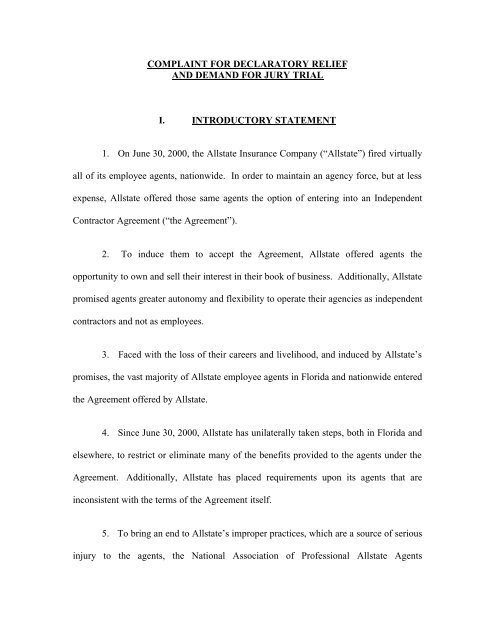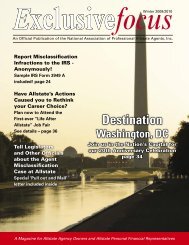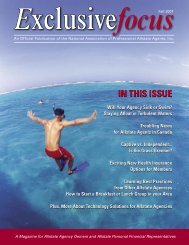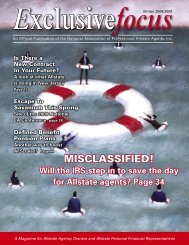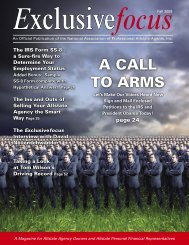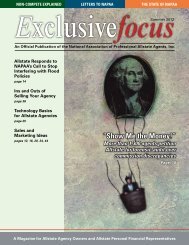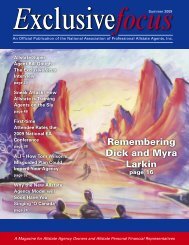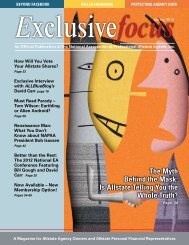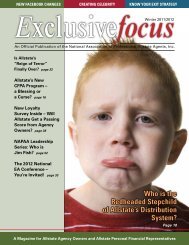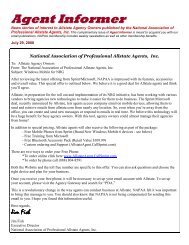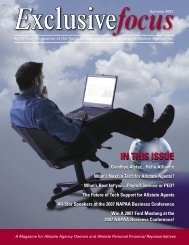COMPLAINT FOR DECLARATORY RELIEF AND DEMAND FOR ...
COMPLAINT FOR DECLARATORY RELIEF AND DEMAND FOR ...
COMPLAINT FOR DECLARATORY RELIEF AND DEMAND FOR ...
Create successful ePaper yourself
Turn your PDF publications into a flip-book with our unique Google optimized e-Paper software.
<strong>COMPLAINT</strong> <strong>FOR</strong> <strong>DECLARATORY</strong> <strong>RELIEF</strong><strong>AND</strong> DEM<strong>AND</strong> <strong>FOR</strong> JURY TRIALI. INTRODUCTORY STATEMENT1. On June 30, 2000, the Allstate Insurance Company (“Allstate”) fired virtuallyall of its employee agents, nationwide. In order to maintain an agency force, but at lessexpense, Allstate offered those same agents the option of entering into an IndependentContractor Agreement (“the Agreement”).2. To induce them to accept the Agreement, Allstate offered agents theopportunity to own and sell their interest in their book of business. Additionally, Allstatepromised agents greater autonomy and flexibility to operate their agencies as independentcontractors and not as employees.3. Faced with the loss of their careers and livelihood, and induced by Allstate’spromises, the vast majority of Allstate employee agents in Florida and nationwide enteredthe Agreement offered by Allstate.4. Since June 30, 2000, Allstate has unilaterally taken steps, both in Florida andelsewhere, to restrict or eliminate many of the benefits provided to the agents under theAgreement. Additionally, Allstate has placed requirements upon its agents that areinconsistent with the terms of the Agreement itself.5. To bring an end to Allstate’s improper practices, which are a source of seriousinjury to the agents, the National Association of Professional Allstate Agents
(“NAPAA”) needs a declaration from this Honorable Court that Allstate’s conductrepresents a breach of, and is inconsistent with, the terms of Allstate’s Agreement withNAPAA’s agent members in Florida.II.THE PARTIES6. The National Association of Professional Allstate Agents is a not-for-profitprofessional trade association incorporated in New York with headquarters in Michigan.NAPAA has members nationwide, including members throughout Florida.7. The Allstate Insurance Company is an Illinois corporation with headquartersin Illinois. Allstate does business throughout the State of Florida.8. This Court’s jurisdiction in this matter arises under 28 U.S.C. §1332(a)(1) and28 U.S.C. §2201. Venue is proper under 28 U.S.C. § 1391(a)(1) and (2).III.FACTUAL BACKGROUNDA. Allstate’s Contractual History with its Agents9. For decades, Allstate hired its insurance agents as employees of thecompany. These employee agents worked under written contracts with Allstate.10. Beginning in the 1990s, Allstate began encouraging its employee agents toterminate their employee status and enter into an Independent Contractor Agreement withAllstate. A number of agents elected to do so, but many did not.
11. Before introducing the Independent Contractor Agreement, Allstate hadmaintained that its agents had no ownership interest in the books of business that theagents themselves had developed. On the contrary, Allstate claimed exclusive ownershipof those books of business.12. To induce agents to enter into the Agreement, Allstate represented to agentsthat, as part of the Agreement, agents would obtain ownership in, and the opportunity tosell their books of business.13. Additionally, Allstate represented that agents would enjoy greater autonomyas independent contractors than they did as employees.14. Even after creating the independent contractor option in the 1990s, Allstatecontinued to apply its detailed work rules and requirements to all agents – employeeagents and independent contractor agents alike.B. Termination of all Agents Nationwide15. In November of 1999, Allstate announced its plan to terminate all of itsemployee agents.16. Under the forced termination, any agent who wished to continue as an Allstateagent would be required, among other things, to execute a Release of Claims AgainstAllstate and to enter a new Independent Contractor Agreement with Allstate.17. In order to induce agents to enter the Agreement following the announcedtermination of all employee agents, Allstate again represented to agents that, as part of
the Agreement, an agent would obtain ownership in, and the opportunity to sell, his or herbook of business.18. Additionally, Allstate again represented that agents would enjoy greaterautonomy as independent contractors than they did as employees.C. The “Preparing for the Future” Information Booklet19. In a publication called Preparing for the Future, which was distributed to allemployee agents prior to termination, Allstate made various representations concerningwhat agents could expect under the Agreement. A copy of the booklet is attached asExhibit 1.20. In the Preparing for the Future booklet, agents were advised that they would“earn an economic interest in the business [they] write,” which would enable them to“sell this interest to a qualified buyer approved by the company” when they elected toterminate their contract. Exhibit 1, p 12.21. Elsewhere, the booklet advised agents of their ability to “manage” their“future financial security” by, among other things, “tak[ing] advantage of the agency saleoption upon termination of [the Agreement].” Exhibit 1, p 12.22. Agents were advised that existing independent contractor agents would beeligible to purchase other agents’ books of business. The booklet set forth generalrequirements (including four specific business requirements) necessary to qualify topurchase another’s book of business. Exhibit 1, p 17.
23. According to the information booklet, agents who became independentcontractors “will have control of [their] time.” Exhibit 1, p 12.D. Allstate Independent Contractor Agreement24. Allstate’s R3001 Exclusive Agency Agreement (the Agreement) purports toestablish and govern the independent contractor relationship between Allstate and itsagents. This same document, with slight modifications over the years, has been issued byAllstate to its independent contractor agents.25. When announcing the termination of all its employee agents in November of1999, Allstate issued “C” and “S” versions of the Agreement, the former to be used byindependent contractor agents who incorporated their agency and the latter to be used byindependent contractor agents who operated sole proprietorships. Save for thesedistinctions, the documents are identical. A copy of the “C” version of the Agreement isattached as Exhibit 2.A and a copy of the “S” version of the Agreement is attached asExhibit 2.B.26. Allstate purports to incorporate several supplemental publications into theterms of the Agreement itself. Paragraph I.C of the Agreement states as follows:The Supplement for the R3001 Agreement (“Supplement”) and the Exclusive AgencyIndependent Contractor Manual (“EA Manual”), and the Allstate Agency Standards(“Agency Standards”) as they may be amended from time to time, are expresslyincorporated in their entirety as part of this Agreement. The Company reserves the rightto amend the Supplement, EA Manual, and Agency Standards at any time without priornotice to Agency, except that notice regarding changes to commission amounts will begiven as indicated in Section XV.
Exhibit 2.A. p 1. Copies of the referenced documents, as they existed in November of1999, have been filed contemporaneously with this Complaint and are as follows:Supplement (Exhibit 3); Independent Contractor Manual (Exhibit 4); Agency Standards(Exhibit 5).1. Contractual Terms Concerning Sales to Existing Agents27. The Agreement provides the agent “an economic interest” in his or her bookof business and provides that “[s]ubject to the terms and conditions set forth in thisagreement and the incorporated supplement and EA Manual, [the agent] may transfer hisentire economic interest in the business written under this Agreement upon termination ofthis Agreement by selling the economic interest in the business to an approved buyer.”Exhibit 2.A, p 7.28. The Independent Contractor Manual, consistent with the representations madein the Preparing for the Future information booklet, confirms agents’ right to sell theirinterest in the book of business to another Allstate agent. Exhibit 4, p 25.29. The manual sets forth four specific business requirements, consistent with therepresentations made in the Preparing for the Future information booklet, that must bemet by an existing agent who seeks to purchase another agent’s economic interest in thebook of business. Exhibit 4, p 25. Those requirements are as follows:a. Buying agent must have sixty-five (65%) percent or less adjusted,capped, paid casualties loss ratio;
. Buying agent must demonstrate ability to provide a proper level ofcustomer service after the sale;c. Buying agent must commit to achieve company business objectives forgrowth, multi-lines sales and profitability; andd. Buying agent must have a professional business relationship withAllstate.2. Contractual Terms Concerning Quotas30. The Agreement provides that the agent will “meet certain business objectivesestablished by the company in the areas of profitability, growth, retention, customersatisfaction and customer service.” The Agreement does not, however, define the term“business objectives,” nor does it set forth any specific objective within the identifiedareas. Exhibit 2.A, p 2.31. The Agreement is silent concerning the purported consequences of an agent’sfailure to meet the undefined “business objectives” established by the company.3. Contractual Terms Concerning Business Development and Call-Forwarding32. The Agreement provides that the agent will act as an agent of the Company“for the purpose of soliciting, selling and servicing insurance and other Companybusiness in accordance with the provisions of this agreement.” Exhibit 2.A, p 2.
33. The Agreement provides the agent authority to advertise subject to Companyapproval of the proposed advertisement. Exhibit 2.A, p 4.34. The Agreement makes the agent solely responsible for his or her expensesincluding “expenses for its sales location, supplies not furnished by the Company,compensation of its employees or other assisting persons whom it engages, telephone,postage, and advertising expenses incurred at its direction, and all other charges andexpenses.” Exhibit 2.A, p 5.35. The Agreement provides that the agent’s sole form of compensation shall becommissions earned under the Agreement for sale of Allstate’s products. Exhibit 2.A, p6.36. The Agency Standards state that all phone calls will be forwarded to theAllstate Agency Support Center when the agency is not open. Exhibit 5, p 1 of ServiceAvailability. However, Allstate pays a reduced commission to agents from resultingsales and further claims discretion to assign the policy to a different agent.4. Contractual Terms Concerning Status as Independent Contractor37. The Agreement states expressly that the relationship between the Companyand the agent “will be that of an independent contractor for all purposes.” Exhibit 2.A, p1.38. The Agreement requires that the agent will be solely responsible for his or herexpenses. Exhibit 2.A, p 5.
39. The Agreement provides that the agent has sole discretion to have businessconducted by employees or other persons at times during which the agent is physicallyabsent, and the Manual states that as an agent, “you will have full control of your time.”Exhibit 4, p 3.40. The Agreement provides that the agent may be asked to meet with Allstate’srepresentatives at times “mutually convenient” to both parties. Exhibit 2.A, p 3.41. The Agreement provides that the agent “has sole and exclusive control overits labor and employee relations policies, and its polices relating to wages, hours, andworking conditions of its employees.” Exhibit 2.A, p 3.42. The Agreement states that the agent shall “keep its sales location open forbusiness as appropriate in the market to provide a proper level of customer service. At aminimum, the agency agrees to operate its sales location consistently with the AgencyStandards.” Exhibit 2.A, p 4. The Agency Standards purport to state specified hours ofbusiness operations during which the agency must be open. Exhibit 5, p 1 of ServiceAvailability.43. The Agreement states that the authority granted to the agent is “nonexclusive.”Exhibit 2.A, p 11.44. The Agreement and all related documents are silent concerning the agent’sability to refer business, other than the sale of insurance products, to third parties.
45. The Agreement and all related documents are silent concerning any obligationof the agent of provide check reading or other banking services for Allstate at the agent’sexpense.COUNT IBREACH OF CONTRACT(Seeking a Judicial Declaration that Allstate May Not Restrictor Prohibit Sales of Books of Business by Imposing HeightenedRequirements for Approval)46. The Agreement provides Allstate agents, including NAPAA’s agent membersin Florida, an ownership interest in their books of business.47. The Agreement recognizes an agent’s right to sell his or her interest in thebook of business, including transfers to existing Allstate agents, upon receiving priorapproval from Allstate.48. The Agreement, by reference to the express standards set out in the manual,sets forth specific requirements which must be met before a sale may be made to aprospective purchaser.49. Allstate has, both nationally and specifically in Florida, made statementsindicating that it has heightened the express requirements that must be met by existingAllstate agents who seek to purchase another agent’s book of business.
50. Allstate has, both nationally and specifically in Florida, made statementsindicating that it will not, as a general rule, approve sales of books of business to existingAllstate agents.51. Allstate has, both nationally and specifically in Florida, refused to approvesales of books of business either because the proposed purchaser is, in fact, an existingAllstate agent or because the proposed purchaser does not meet the heightenedrequirements Allstate has set forth.writing.52. Typically, Allstate will not put the basis for its refusal of a proposed sale in53. Plaintiff disputes Allstate’s position that it may unilaterally modify therequirements necessary for a sale of a book of business and contends that thismodification represents a breach of the Agreement.54. As a result of Allstate’s unilateral modification of the requirements fortransferring the book of business, all Allstate agents, including NAPAA’s agent membersin Florida, have suffered and will continue to suffer injury.55. The heightened standards have shrunk the pool of potential purchasers therebyimpeding agents’ ability to sell their books of business for fair value, if at all.56. Additionally, the heightened requirements have deprived a number of Allstateagents the opportunity to acquire additional books of business.
57. Additionally, the reduced pool of potential purchasers exposes agents to therisk that Allstate will unilaterally terminate an agent’s Agreement leaving the agentwithout any viable opportunity to sell his or her interest in the book of business within theninety (90) day window of opportunity provided by Allstate under the Agreement.WHERE<strong>FOR</strong>E, Plaintiff seeks a declaration by the Court under the terms of theAgreement that Allstate may not restrict or prohibit sales of books of business to existingor future Allstate agents by imposing heightened requirements for approval of salesbeyond those requirements set forth in the original Agreement. In addition, Plaintiffseeks a declaration by the Court under the terms of the Agreement that Allstate mustprovide agents written notice of the denial of a proposed sale of the book of businessincluding the reasons for the denial.COUNT IIBREACH OF IMPLIED COVENANT OFGOOD FAITH <strong>AND</strong> FAIR DEALING(Seeking a Judicial Declaration That Allstate May Not Restrictor Prohibit Sales of Books of Business by Imposing HeightenedRequirements for Approval)58. There exists within the Agreement between Allstate and its agents an impliedcovenant of good faith and fair dealing.
59. The Agreement provides Allstate agents, including NAPAA’s agent membersin Florida, an ownership interest in their books of business.60. The Agreement recognizes an agent’s right to sell his or her interest in thebook of business, including transfers to existing Allstate agents, upon receiving priorapproval from Allstate.61. The Agreement, by reference to the express standards set out in the manual,sets forth specific requirements which must be met before a sale may be made to aprospective purchaser.62. Allstate has, both nationally and specifically in Florida, made statementsindicating that it has heightened the express requirements that must be met by existingAllstate agents who seek to purchase another agent’s book of business.63. Allstate has, both nationally and specifically in Florida, made statementsindicating that it will not, as a general rule, approve sales of books of business to existingAllstate agents.64. Allstate has, both nationally and specifically in Florida, refused to approvesales of books of business either because the proposed purchaser is, in fact, an existingAllstate agent or because the proposed purchaser does not meet the heightenedrequirements Allstate has set forth.writing.65. Typically, Allstate will not put the basis for its refusal of a proposed sale in
66. Plaintiff disputes Allstate’s position that it may unilaterally modify therequirements necessary for a transfer of a book of business and contends that thismodification represents a breach of the implied covenant of good faith and fair dealingcontained within the Agreement.67. As a result of Allstate’s unilateral modification of the requirements fortransferring the book of business to an existing Allstate agent, all Allstate agents,including NAPAA’s agent members in Florida, have suffered and will continue to sufferinjury.68. The heightened standards have shrunk the pool of potential purchaserscausing a deflation in value of the books of business.69. Additionally, the heightened requirements have deprived a number of Allstateagents of the opportunity to acquire additional books of business.WHERE<strong>FOR</strong>E, Plaintiff seeks a declaration by the Court under the terms of theAgreement that Allstate may not restrict or prohibit sales of books of business to existingor future Allstate agents by imposing heightened requirements for approval of salesbeyond those requirements set forth in the original Agreement. In addition, Plaintiff seeksa declaration by the Court under the terms of the Agreement that Allstate must provideagents written notice of the denial of a proposed sale of the book of business includingthe reasons for the denial.COUNT III
FRAUDULENT INDUCEMENT(Seeking a Judicial Declaration that Allstate FraudulentlyInduced Allstate Agents to Enter the Independent Contractor Agreement)70. In promoting the Agreement within the Preparing for the Future booklet andelsewhere, Allstate represented to its agents that, if they entered into the Agreement, theywould acquire an ownership interest in their books of business.71. Allstate further represented that, if the agents entered into the Agreement,they would be able to sell their newly acquired interest to third parties, including existingAllstate agents.72. Allstate reiterated these representations within the Agreement itself.73. At the time of making these representations, Allstate knew that it did notintend to allow sales as represented.74. Allstate has, both nationally and specifically in Florida, made statementsindicating that it has heightened the specific requirements that must be met before a saleof a book of business may be made to a prospective purchaser.75. Allstate has, both nationally and specifically in Florida, made statementsindicating that it will not, as a general rule, approve sales of books of business to existingAllstate agents.
76. Allstate has, both nationally and specifically in Florida, refused to approvesales of books of business either because the proposed purchaser is in fact an existingAllstate agent or because the proposed purchaser does not meet the heightenedrequirements Allstate has set forth.77. Allstate made these representations expecting that Allstate agents would relyon said representations and for the purpose of inducing Allstate agents to enter into theAgreement.78. Allstate agents, including NAPAA’s agent members in Florida, did rely onthose representations and were induced by those representations to enter into theAgreement. As a result of Allstate’s unilateral modification of the requirements forselling the book of business to an existing Allstate agent, all Allstate agents, includingNAPAA’s agent members in Florida, have suffered and will continue to suffer injury.WHERE<strong>FOR</strong>E, Plaintiff seeks a declaration by the Court that Allstatefraudulently induced its agents to enter the Agreement.COUNT IVBREACH OF CONTRACT(Seeking a Judicial Declaration that Allstate May NotUnilaterally Modify the Agreement by Adding or Increasing Production Quotas)
79. In the spring of 2000, Allstate introduced its Exclusive Agency ResultsMeasurement setting forth the “expected results” of an agent’s sales production.80. The “expected results” purportedly imposed upon agents are based on“average” (not “mean”) production within a market area as defined by Allstate.81. The “expected results” represent, for the first time, specific quotas beingimposed upon agents by Allstate.82. Moreover, for the first time, Allstate has represented within its ExclusiveAgency Results Measurement its intention to terminate agents who do not meet the“expected results” in any of three specified areas. Consistent with this threat, Allstate hasin fact terminated agents for failure to meet the “expected results” in some regions of thecountry.83. Since introducing the “expected results” in 2000, Allstate has now increasedthose “expected results” for 2001 – in some regions representing an increase of almosttwo hundred (200%) percent.84. Allstate’s “expected results” or quotas represent additional terms notcontained within the Agreement between the parties and thus constitutes a breach of thatAgreement. Additionally, the quotas are inconsistent with the entire concept of anindependent contractor relationship.
85. Plaintiff disputes Allstate’s position that it may unilaterally impose quotasupon the agents and that it may unilaterally increase those quotas at any time at itsdiscretion.86. As a result of Allstate’s unilateral position and modification of quotarequirements, all Allstate agents, including NAPAA’s agent members in Florida, havesuffered and will continue to suffer injury.WHERE<strong>FOR</strong>E, Plaintiff seeks declaration by the Court under the terms of the Agreementthat Allstate may not unilaterally modify the Agreement by adding or increasingproduction quotas.COUNT VBREACH OF IMPLIED COVENANT OFGOOD FAITH <strong>AND</strong> FAIR DEALING(Seeking a Judicial Declaration that Allstate May NotUnilaterally Modify the Agreement by Adding or Increasing Production Quotas)87. There exists within the Agreement between Allstate and its agents an impliedcovenant of good faith and fair dealing.88. In the spring of 2000, Allstate introduced its Exclusive Agency Results Measurementsetting forth the “expected results” of an agent’s sales production.89. The “expected results” purportedly imposed upon agents are based on “average” (not“mean”) production within a market area as defined by Allstate.90. The “expected results” represent, for the first time, specific quotas being imposedupon agents by Allstate.
91. Moreover, for the first time, Allstate has represented within its Exclusive AgencyResults Measurement its intention to terminate agents who do not meet the “expectedresults” in any of three specified areas. Consistent with this threat, Allstate has in factterminated agents for failure to meet the “expected results” in some regions of thecountry.92. Since introducing the “expected results” in 2000, Allstate has now increased those“expected results” for 2001 – in some regions representing an increase of almost twohundred (200%) percent.93. Allstate’s “expected results” or quotas represent additional terms not contained withinthe Agreement between the parties and thus constitutes a breach of the implied covenantof good faith and fair dealing. Additionally, the quotas are inconsistent with the entireconcept of an independent contractor relationship.94. Plaintiff disputes Allstate’s position that it may unilaterally impose quotas upon theagents and that it may increase those quotas at any time at its discretion.95. As a result of Allstate’s unilateral position and modification of quota requirements,all Allstate agents, including NAPAA’s agent members in Florida, have suffered and willcontinue to suffer injury.WHERE<strong>FOR</strong>E, Plaintiff seeks a declaration by the Court under the terms of theAgreement that Allstate may not unilaterally modify the Agreement by adding orincreasing production quotas.COUNT VIBREACH OF CONTRACT(Seeking a Judicial Declaration That Agents Are Entitledto Full Commissions on Allstate Agency Support Center Sales)96. The Agency Standards state that the agent will be required to forwardtelephone calls to an Allstate Agency Support Center when the agent’s office is not open.97. Under Allstate’s call-forwarding system, any call to an agency during nonbusinesshours (including lunch) is forwarded directly to an Allstate employee at an
Allstate Agency Support Center. This includes telephone calls from existing agencycustomers, as well as prospective agency customers.98. The Allstate employee handling the forwarded call will, if the opportunityexists, attempt to solicit business from the caller. Unless the caller insists on beingreturned to the agent to write this business, Allstate will write the business directly andwill then, within its discretion, assign the business to any agent – not necessarily theagent through whose office the call was forwarded. The assigned business carries asignificantly reduced commission (both initially and in subsequent renewals) from thatwhich the agent would earn if he or she were allowed to write the business directly.99. In many instances, the caller being forwarded to Allstate for insurance sales isresponding to advertising obtained and paid for by the agent.100. Additionally, the caller is initially placing the call on a telephone lineobtained and paid for by the agent.by the agency.101. Further, the caller is often responding directly to the good will established102. The Agreement does not state that an agent shall be denied commissionson sales forwarded by the agent to Allstate through Allstate’s mandatory Agency SupportCenter. However, Allstate claims that it has no obligation to pay full commissions onthese sales.
103. Plaintiff disputes Allstate’s contention and maintains that, under the termsof the Agreement, agents are entitled to full commissions on sales to callers forwarded toAllstate by the agents.WHERE<strong>FOR</strong>E, Plaintiff seeks a declaration by the Court that under the terms andprovisions of the Agreement agents are entitled to receive full commissions on anybusiness generated from calls forwarded to Allstate Agency Support Centers.COUNT VIIBREACH OF IMPLIED CONTRACT OFGOOD FAITH <strong>AND</strong> FAIR DEALING(Seeking a Judicial Declaration That Agents Are Entitledto Commissions on Allstate Agency Support Center Sales)104. There exists within the Agreement between Allstate and its agents animplied covenant of good faith and fair dealing.105. The Agency Standards state that the agent will be required to forwardtelephone calls to an Allstate Agency Support Center when the agent’s office is not open.106. Under Allstate’s call-forwarding system, any call to an agency duringnon-business hours (including lunch) is forwarded directly to an Allstate employee at anAllstate Agency Support Center. This includes telephone calls from existing agencycustomers, as well as prospective agency customers.
107. The Allstate employee handling the forwarded call will, if the opportunityexists, attempt to solicit business from the caller. Unless the caller insists on beingreturned to the agent to write this business, Allstate will write the business directly andwill then, within its discretion, assign the business to any agent – not necessarily theagent through whose office the call was forwarded. The assigned business carries asignificantly reduced commission (both initially and in subsequent renewals) from thatwhich the agent would earn if he or she were allowed to write the business directly.108. In many instances, the caller being forwarded to Allstate for insurancesales is responding to advertising obtained and paid for by the agent.109. Additionally, the caller is initially placing the call on a telephone lineobtained and paid for by the agent.by the agency.110. Further, the caller is often responding directly to the good will established111. The Agreement does not state that an agent shall be denied commissionson sales forwarded by the agent to Allstate through Allstate’s mandatory Agency SupportCenter. However, Allstate claims that it has no obligation to pay commissions on thesesales.112. Plaintiff disputes Allstate’s contention that Allstate has no obligation topay commissions on sales from forwarded calls and maintains that Allstate’s failure to doso represents a breach of the implied covenant of good faith and fair dealing.
WHERE<strong>FOR</strong>E, Plaintiff seeks a declaration by the Court that under the terms andprovisions of the Agreement agents are entitled to receive full commissions on anybusiness generated from calls forwarded to Allstate Agency Support Centers.COUNT VIIIBREACH OF CONTRACT(Seeking a Judicial Declaration That Agents are not Required toEngage in or Refrain From Certain Business Practices)113. The “C” version of the Agreement (applicable to incorporated agencies)provides that: “The relationship between [Allstate] and Agency and its officers,directors, shareholders, members, employees, and other persons working in connectionwith this Agreement, will be that of an independent contractor for all purposes.” Exhibit2.A, p 1.114. The “S” version of the Agreement (applicable to sole proprietors) states:“You are an independent contractor for all purposes and not an employee of theCompany. You will have full control of your time and the right to exercise independentjudgment as to the time, place, and manner of performing your duties, which are definedin this Agreement and the incorporated Supplement, EA Manual and Agency Standards.”Exhibit 2.B, p 1.115. Notwithstanding the express terms of the Agreement, Allstate hasrepeatedly attempted to exert a level of control over the independent contractor agents
that is inconsistent both with the Agreement itself and with the concept of an independentcontractor relationship.116. In at least one respect, the Agreement itself is internally inconsistent. Itstates that agents shall have full control over their time and over management of theirstaff time. At the same time, it purports to require agents to maintain prescribed businesshours.117. The Agreement provides that the agent will, when requested, “meet withCompany representatives at mutually convenient times to discuss various businesstopics.” However, in practice, Allstate routinely and unilaterally directs agents to attend“mandatory” meetings.118. The Agreement places no restriction on the agent’s ability to makereferrals, other than the referral of insurance products to third parties. However, Allstatehas, by its written statements, purported to restrict agents’ ability to refer customers toother vendors or service providers.119. The Agreement provides that the agent will be responsible for thepayment of expenses incurred by the agent in performing under the Agreement. TheAgreement does not, however, make the agent responsible for expenses incurred solelyon Allstate’s behalf. However, Allstate has recently announced a new “agencyremittance process.” As announced, the process will force agents to assume a portion ofAllstate’s banking expenses.
120. Under present operations, Allstate maintains a bank account at its expenseinto which the Allstate agent deposits any Allstate funds collected by the agent onAllstate’s behalf.121. Under the proposed conversion, an agent will now be required to scanchecks manually with a check reader provided and installed by Allstate. In addition, theagent will be required to establish and maintain at the agent’s expense a separate bankaccount into which the agent will deposit any funds or checks that cannot be processedwith the check reader.122. One of the express purposes of this new “agency remittance process” is to“decrease Allstate’s banking costs.”123. To the extent Allstate seeks to restrain or proscribe certain conduct byagents in a fashion that is inconsistent with, contrary to, or in addition to the terms of theAgreement, such conduct by Allstate constitutes a breach of the Agreement.124. Allstate agents, including NAPAA’s agent members in Florida, havesuffered and will continue to suffer injury as a result of Allstate’s breach of theAgreement.WHERE<strong>FOR</strong>E, Plaintiff seeks a declaration by this Court that:A. Allstate may not establish mandatory hours of operation for its agents ortheir agencies;
B. Allstate may not mandate the agent’s attendance at a meeting, event orfunction without first establishing a mutually convenient meeting time;C. Allstate may not prohibit its agents from using their independent businessjudgment in making business referrals concerning products or services notoffered by Allstate;D. Allstate may not require its agents or their agencies to maintain bankaccounts at the latter’s expense for Allstate’s benefit.COUNT IXVIOLATION OF FLORIDA FRANCHISE ACT(Seeking a Judicial Declaration that Allstate’s Conduct Violated Franchise Act)125. Allstate agents have been granted the right to sell Allstate insuranceproducts pursuant to Allstate’s standards and requirements.126. The Allstate agents rely on Allstate for their insurance products.127. Allstate agents are franchisees under the Florida Franchise Act (“Act”).128. As a result of Allstate’s unilateral modifications of the requirements fortransferring a book of business, Allstate has misrepresented to its agents, including
NAPAA’s agent members in Florida, the agents’ chances of success for both existing andproposed franchises all in violation of the Act.129. Additionally, the heightened standards have shrunk the pool of potentialpurchasers, thereby impeding agents’ ability to sell their franchises for fair value, if at all,all in violation of the Act.130. The heightened requirements have also deprived a number of Allstateagents the opportunity to acquire additional books of business to expand their franchisesall in violation of the Act.131. Additionally, the reduced pool of potential purchasers exposes agents tothe risk that Allstate will unilaterally terminate an agent’s Agreement, leaving the agentwithout any viable opportunity to sell his or her interest in the book of business all inviolation of the Act.132. Allstate’s representations within its Exclusive Agency ResultsMeasurement and its intention to terminate agents who do not meet the “expected results”in any of three specified areas, and the resulting termination of agents for failure to meetthe “expected results” in some regions of the country, represent violations of the Act.133. The portions of the Agreement that force the agents to be responsible forthe payment of expenses incurred by the agent in performing under the Agreement, andthe new “agency remittance process,” which forces agents to assume a portion ofAllstate’s banking expenses, represent a failure on the part of Allstate to disclose theknown required total franchise investment all in violation of the Act.
WHERE<strong>FOR</strong>E, Plaintiff seeks a declaration by the Court that Allstate’s conductviolates the Florida Franchise Act.CONCLUSIONFor the aforementioned reasons, Plaintiff seeks declarations by the Courtconsistent with the specific allegations and request for relief set forth above.Respectfully Submitted,WRIGHT PENNING, P.C.By:_________________________________DIRK A. BEAMER (P53290)27655 Middlebelt Road, Ste. 170Farmington Hills, MI 48334(248) 477-6300KYNES, MARKMAN & FELMAN, P.A.By:_________________________________
JAMES E. FELMAN, ESQ.100 South Ashley, Suite 1300Tampa, FL 33602(813) 229-1119Attorneys for PlaintiffDated: November 9, 2001


